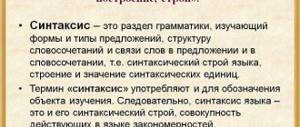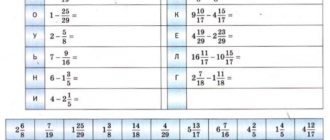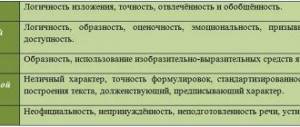Continuous spelling of adverbs
It is worth noting that the continuous spelling of adverbs is typical for words formed by prefixes:
- impossible - absolutely impossible;
- for free - for free;
- always - forever.
To understand how to write an adverb correctly, you need to find and analyze the original form of the word and its meaning.
Let me give you a few examples:
The adverb “briefly” was formed from the adjective “brief” in the comparative degree and the preposition in . These two parts cannot live without each other, they cannot be separated (the word “in short” does not exist). This means that the adverb is written together.
The adverb “sneaky” was formed with the help of two prepositions from , under and the obsolete noun “tishka”, which means “silence”. Today the adverb means “to do something on the sly.” Prepositions cannot be separated from a noun. The word “tishka” is not used in modern Russian. This means that the adverb is written together.
Now let's move on to the rules:
- The continuous spelling of adverbs is typical for words that are formed from collective numerals using the prefixes in- and na-:
Because of this problem, Svetlana's entire essence was divided into two.
It wasn't so scary for the four of us to go into the forest.
During the morning training, the dog showed speed twice as fast as usual.
- Adverbs formed from adjectives using the prefixes na-, do-, s-, v-, po- are written together:
Grandma was completely tired of this conversation.
In the heat of the moment, she said many offensive words to her husband.
Staying in the sun for a long time is harmful to health.
- Adverbs that are formed from nouns rarely used in the Russian language.
Roman went for a run early in the morning.
She fell to the ground from a lightning strike.
The cup shattered.
- Adverbs with meanings of time and space:
The birds flew up.
Mom said that first you need to learn the poem, and then go outside.
A purposeful person only moves forward.
- Adverbs that were formed using the preposition v-, the particle -pol- and the noun:
Ira stood half-turned towards the store.
In order not to wake their son, they spoke in low voices.
There are adverbs that, according to the rules, should be written separately, but there are no rules without exceptions. Remember these words. They are written together:
Spelling adverbs with a hyphen
Spelling adverbs with a hyphen is also called semi-fluid .
| Rules | Examples | Exceptions |
| Adverbs with the prefix po-, which end in -mu (-emu), -i (-ski, -tski, -ki, -i) | in Russian, in a new way, in a bearish way | therefore, therefore, therefore, one by one |
| Adverbs formed using the prefix v- (vo-) from ordinal numbers | Firstly Secondly Thirdly | |
| Adverbs formed by combining two words with the same root or synonyms | Barely, dearly, exactly |
Peculiarities of spelling adverbs with prepositions are studied in 7th grade.
TOP 5 articles that are read along with this
- 1. Spelling adverbs
- 2. Integrated and separate spelling NOT with participles
- 3. Hyphen in adverbs
- 4. How do you spell NOT with adverbs?
- 5. Combined hyphen and separate spelling of adverbs
Separate writing of adverbs
When spelling adverbs separately, you also need to find the word from which the adverb was formed and analyze it.
For example, the adverb “as a joke” was formed from a noun with the addition of the preposition in . It has a characteristic identifying feature of the adverb - the suffix -у-. If you remove the preposition and change the case form, you get the word “joke”, which is used in Russian. This means that the adverb must be written separately.
Let's find out which adverbs are written separately, according to the rules of the Russian language:
- Those formed from collective numerals using the prefix po-:
The children stood in a line of two.
She repeated the poem ten times, but still could not remember it.
- Those formed from adjectives that begin with a vowel and are paired with prepositions without, in, with:
She worked out in the gym tirelessly.
Ivanov is used to working openly.
Thin lace underwear is always ironed from the inside out.
- Adverbs that are formed from nouns using prepositions to, on, with:
They ate their fill of ice cream.
Due to her busy schedule, Secretary Maria has been eating lunch on the run for a week.
The boxer received an unexpected blow.
- Also, the rules for writing adverbs separately state: adverbs are written separately if the derived noun with a preposition has retained its case forms:
He walked on tiptoes - he stood on tiptoes;
Oleg took a new magazine from under his arm; Oleg took a new magazine under his arm;
The family lived abroad - the family went abroad.
The word “abroad” is written together if it is an addition in a sentence and the question “with what or what?” is compared to it:
The old man was dissatisfied (with what?) abroad.
She stood in the center of Rome and saw (what?) abroad.
- Adverbs with prepositions under, without, for are written separately:
They have the strength to overcome all adversity.
Luda told the news without concealment.
Nikolai returned home after midnight.
- Adverbs that are formed from plural nouns ending in -ah-/-yah- and having the prepositions in-, na-:
I'll send a letter one of these days.
He was on the run.
They spoke joyfully about the long-awaited gift.
- Adverbs that include forms of the nominative and prepositional cases of the same noun are written separately:
Friendship is friendship, but work is separate.
Gena was an eccentric eccentric.
- Adverbs that consist of two repeated nouns and are paired with prepositions:
Dad should be back any minute.
It was more difficult for him to work in this team day by day.
There are also some exception adverbs that are written separately:
The hyphenated spelling of adverbs is influenced by the presence of certain prefixes and suffixes. With their help, adverbs were formed from other parts of speech.
Adverbs are written with a hyphen in the following cases:
- Adverbs that are formed from the full form of adjectives using the prefix po- and the suffix -om-/- him-/-i-:
Tim was truly happy with her.
The kid behaved heroically at the doctor.
- Adverbs that are formed from ordinal numbers and consist of the prefix v-/vo- and the suffix -yh-/-ich-:
First of all, music is wonderful! Secondly, it improves the human soul.
- Adverbs that are formed by repeating words and complicated by a prefix or suffix:
It’s nice to look at a cleanly made bed.
He was so tired that he could barely open the door.
Little by little things progressed.
- Adverbs with the prefix po- and the ending -у/-м:
It was not possible to have a kind conversation with them.
She spoke English well.
- Adverbs containing the prefix ko-:
The students completed the test somehow.
He just returned from somewhere.
- Adverbs containing the particles either, either, or:
For some reason they were sad.
They will somehow get out to sea.
Finally, grandma returned from the store.
The biggest difficulties in spelling adverbs arise because they are formed from the grammatical forms of other parts of speech. Sometimes it is difficult to distinguish adverbs from the homonymous form of a noun or adjective.
Continuous and hyphenated spelling of adverbs. Lesson materials
Continuous, hyphenated and separate writing of adverbs is a topic that is traditionally discussed in the 7th grade. True, by the time of the Unified State Exam and entrance examinations, it manages to fly out of my head. And then the terrifying imagination “he gradually fell in love with Olga” and “she spoke German easily” appeared. Let's not be scared: let's remember everything again, analyzing the rules, exceptions and giving examples.
As you know, information is better remembered if it takes a different format. A special gift for you and your students: a set of 22 cards
with rules for correct spelling of adverbs. You can send it to the class in a group on social networks, you can print it out and post it on a stand, or you can play a pedagogical game based on the principle “remember more examples” or “make up sentences with these words.” You can download the archive at the bottom of the page!
Russian language. 7th grade. Workbook with test tasks
Designed to consolidate and test spelling knowledge. Contains tasks aimed at improving the ability to comprehend someone else's statement, freely and correctly express thoughts in oral and written speech, taking into account different communication situations and in accordance with the norms of the literary language. Special icons mark tasks aimed at developing meta-subject skills and personal qualities of students.
Buy
First, let's look at cases when adverbs are written together.
If an adverb is formed from a preposition + adverb
Examples: to this day, came from outside, forever fixed, on the contrary, I see right through it, it was the day before yesterday, the day after tomorrow, extremely unlikely, not necessary for nothing.
Be careful!
The spelling preposition + unchangeable word should not be confused with such adverbs.
Examples: see you tomorrow, see you in the morning, at random, bring it to nothing, with a bang.
If an adverb is formed from the prepositions “in” and “on” + a collective numeral
Examples: three times more, half as much, grandmother said in two.
Be careful!
Separate writing: walk in twos, divided in threes.
If an adverb is formed from a preposition + a short adjective
Examples: takes to the left, goes dry, fell dead, from afar, hastily, little by little, wasting time, slowly, said in the heat of the moment.
If an adverb is formed from a preposition + a full adjective and a pronoun
Examples: hard-boiled, came close, went hand-to-hand, this often happens, recklessly, at random, this is happening for the first time, probably they played a draw, with all their might.
Be careful!
Adverbs consisting of the preposition “in” + an adjective starting with a vowel will be written separately.
Example: played openly.
If an adverb is formed from a preposition + noun
Examples: forward, from the side, sometimes, with your own eyes, backwards, in starts, at random, in addition, on the contrary, involuntarily, soft-boiled, squatted.
Similar adverbs include the following:
Option 1. Adverbs containing forms that are not used in modern language.
Examples: to pieces, on loan, in return, locked up, in person, get away, waddle, to the ground, familiar, did on the sly, from time immemorial, to the ground, did at random, backhand, at random, ran away, fell to the ground, rightly so, behind, by hearsay, foolishly, got up early, sleepy, too much, etc.
Russian language, grade 7
Razumovskaya M.M., Lvova S.I., Kapinos V.I., Lvov V.V.
Option 2. Adverbs following the rule: if between the preposition or prefix and the noun forming the adverb, a defining adjective, pronoun, numeral cannot be inserted without changing the meaning, or if a case question cannot be posed to the noun.
Examples: wade, fly, to your heart's content, for nothing, not half as good, really, don't eat dry food, in a row, right through, did it out of spite, by heart (learn), for show, right through, wandered at random, from birth, partly, took them one by one, over the shoulder (chopping), right away, I’ve never seen anything like this.
Option 3. Adverbs that have a spatial or temporal meaning, which contain the following nouns: top, bottom, before, back, height, distance, century, beginning.
Be careful!
Some of these adverbs can be preceded by a qualifying word, but this does not affect the continuous spelling.
Examples: up, at the top, to the top, to the top, to the top, from above; down, below, down, to the bottom, below; forward, forward; back; up; into the distance, away, from a distance; forever, forever, forever, forever, forever; at first, at first.
Be careful!
If a phrase contains explanatory words and a noun, then the above adverbs are written separately.
Examples: to the top of the mountain, to the distant heights, to the blue distance, forever and ever, at the beginning of the journey, from the beginning of the school year.
Nouns with prepositions, close in meaning to adverbs, are written together in cases
Option 1. If a qualifying word can be added between the preposition and the noun
Examples: in (forest) silence, at (all) gallop, for a (brief) moment.
Option 2. If the preposition has a consonant at the end, and the noun at the beginning has a vowel
Examples: barely enough, alone, point-blank, downhill, in retaliation.
Option 3. If a noun in one meaning retains case forms in combination with a preposition
Examples: abroad/abroad, according to conscience/in conscience, on tiptoe/on tiptoe, at home/at home, for memory/from memory.
Option 4. Special combinations of nouns with prepositions
- Preposition “with”: on the fly, with a run, with acceleration, with a swing, with a swoop, on the move;
- Preposition “on”: on the run, on the fly, on the move, on the weight, in sight, in appearance, on the weight, on the taste, on the eye, on the eye, on the sin, on the marvel, on the touch, on the glory, on the laughter;
- Preposition “without”: without looking back, without waking up, indiscriminately, to no avail, without restraining, without stopping, without getting tired;
- Preposition “to”: to the bitter end, to the point of failure, to failure, to death, to the point of falling
Russian language, grade 7
Razumovskaya M.M., Lvova S.I., Kapinos V.I., Lvov V.V.
Option 5. Combination of prepositional forms of nouns and negations “not” and “nor”
Examples: not in moderation, not to the credit, beyond strength, not to taste, not good, not for an iota, not for a penny, not in a hurry.
Option 6. Combination of the prepositions “in” and “on” with nouns in pp., which denote place, state and time
Examples: in pregnancy, in hearts, in joy, in heads, in legs.
If an adverb is formed from a preposition + pronoun
Examples: why, because, therefore, therefore, why, therefore, why, then, how much.
Let's move on to cases when adverbs are written with a hyphen. There are much fewer such cases, so it won’t be difficult to remember them.
Special adverbs denoting enumeration are written with a hyphen
Examples: firstly, secondly, thirdly, etc.
Russian language, grade 7 Razumovskaya M.M., Lvova S.I., Kapinos V.I., Lvov V.V.
Adverbs with po-, formed from adjectives and pronouns
Examples: in Russian, in German (and also in Latin), in a bird's way, in a nightingale's way, differently, in my opinion, empty, still, apparently.
Be careful!
In adverbs with the prefix po-, formed from compound adjectives written with a hyphen, the hyphen is written only after po-, for example: in social democratic.
Exception:
the adverb na-gora is written with a hyphen.
This is a term that means rising to the surface of the earth “The miners rolled up trolleys here, tipped them into the bunker, and from the bunker the ore was scooped up with buckets into the mountain” (A.G. Lazarchuk).
Russian language. 7th grade. Textbook
The textbook, which continues the completed line of educational and methodological sets in the Russian language for grades 5-9, is written according to the original author’s methodology, implementing the idea of synthesizing the speech development of schoolchildren with special linguistic training.
Buy
One and two letters n in adverbs ending in -o and -e
Now let's move on to the letters -n- in adverb suffixes.
In fact, using them correctly in writing and speaking is not as difficult as it seems.
n are written in adverbs as in other independent parts of speech (adjective, verb, etc.) from which they are formed:
- convenient - convenient;
- restrained - restrained.
Another hint: in adverbs, after consonants, one n :
We carefully studied the traffic rules.
The puppy seemed sad.
Now let's move on to the actual rules.
- One letter n in adverbs starting with -o, -e is written in words that are formed from non-prefixed imperfective verbs:
For some reason she answered the questions in a confused way.
After sleeping, the blanket was crumpled.
- with one letter n . The word is an exception.
- The two letters nn are written in adverbs formed from perfective verbs:
The child pursed his lips offendedly and turned to the window.
Exhausted, Dasha closed the book in confusion.
- The two letters nn in adverbs starting with -o, -e are written in words formed from nominal adjectives with the suffixes -enn-/-onn-:
They installed new windows in the house efficiently.
Polina was temporarily unable to work at the factory due to a leg injury.
- The two letters nn are written in adverbs formed from nouns with the stem ending in n:
His demands are completely legitimate.
She still remembered his truly gentlemanly act.
- Two letters nn are written in adverbs formed from verbal nouns of adjectives or participles with a stem in -ovanny, -evanny:
The children left the classroom in an orderly manner.
The group understood that these actions were risky.
- The two letters nn in adverbs starting with -o, -e are written in words formed from the merger of two stems:
She purposefully walked towards victory.
Letters o and e after sibilants at the end of adverbs
The rules about vowels in adverb suffixes are also easy to remember.
- The letter o after sibilants in adverbs is written in the stressed position:
fresh on the shore .
The pioneers coped with the task well .
The only exception e is used under stress, is the adverb yet.
- The letter e after sibilants in adverbs is written in an unstressed position:
Andrey always spoke singing .
The artists performed brilliantly .





